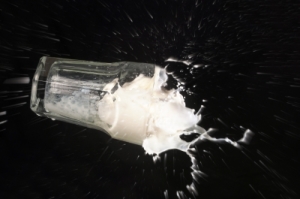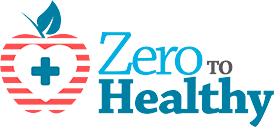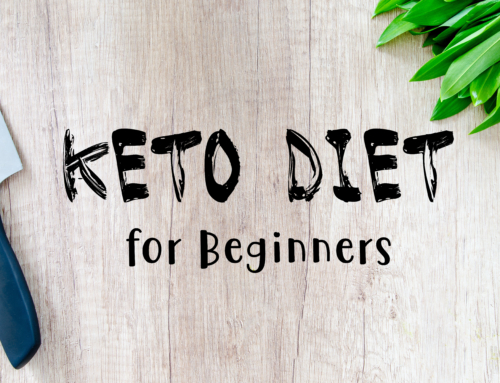 What’s in a glass of cow’s milk?
What’s in a glass of cow’s milk?
You may be expecting to hear something along the lines of calcium, vitamins A and D, protein, and other nutrients that we believe are beneficial to the body. Although cow’s milk does contain these beneficial components, it also contains acidic animal protein, pus cells, bovine growth hormone, feces, and antibiotics, among other things – all of which create a terrible imbalance in the body. Instead of making bones stronger these detrimental components actually leech calcium from the bones!
We seem to be the only species of mammals that drink milk after infancy, and definitely the only species that drinks another species’ milk. Cow’s milk is not designed for human consumption. Calves are about 100 pounds at birth and almost 8 to 10 times heavier by the time they are weaned. So why is it that humans feel the need to continue drinking milk after they are weaned from breast milk? Human milk is very different in composition from cow’s milk or goat’s milk or any other mammal’s milk.
According to a study published in the American Journal of Epidemiology, Cow’s milk contains on average about three times the amount of protein than human milk does, which creates metabolic disturbances in humans that have detrimental bone health consequences. How is this possible when a glass of milk is touted to have 300 mg of calcium? A high concentration of calcium is supposed to be beneficial for our bones and growth, right? Shockingly, the answer is a resounding NO, according to the Harvard School of Public Health. Over time, a flawed belief that humans are required to consume three glasses of milk daily to sustain bone health and strength created the milk myth. Multiple studies have debunked these ideas.
Here is the Top 5 Reasons Why I don’t Drink Milk!
1. Lactose Intolerance
Pasteurization (the process of heating and cooling milk in order to kill bacteria) and homogenization (the process used to allow the shipment of milk over long distances) of milk damages the proteins and can make it harder for people’s bodies to digest it. In addition, the pasteurization process destroys a majority of enzymes and vitamins and minerals. These crucial enzymes aid in the digestion process. According to USA Today approximately 60% of adults cannot digest milk. Interestingly enough about 75% of the population is lactose intolerant. A significant portion of the population is allergic to milk although the allergic reactions may not be obvious. A milk allergy is characterized by loose stools, cramping, runny nose, watery eyes, and itchy skin. Drinking milk with a milk allergy or lactose intolerance harms your digestive system and immune system over time as you continue to consume it.
Two studies were conducted in groups of children with ‘recurrent abdominal pain of childhood,’ one study performed in Boston and the other in San Francisco both concluded that one-third of such children had their symptoms on the basis of lactose intolerance. The simple solution was to remove all milk and milk-containing foods from the diet.
 2. Weight Gain
2. Weight Gain
Milk starts out being full of healthy gut bacteria that are benefical. However, during pasteurization (rapid heating and cooling) all the beneficial bacteria needed for your gut needs to stay healthy are destroyed. Milk also contains certain proteins that make it difficult to digest, these has been linked to weight gain. Despite industry claims that milk helps with weightloss, a study of more than 12,000 children showed that the more milk they drank, the more weight they gained. More surprising is that skim and 1 percent milk appeared to lead to more weight gain than drinking 2 percent or whole milk. The study also found that replacing soda with milk did not lead to weight loss.
3. Prostate Cancer
Prostate cancer is the fourth most common malignancy among men worldwide. An estimated 400,000 new cases diagnosed annually, accounting for 3.9 percent of all new cancer cases. Epidemiologic evidence strongly suggests that dietary factors play a major role in prostate cancer progression and mortality. Some studies suggest that men who eat larger amounts of dairy products may have a higher risk for prostate cancer. Milk products also have calcium. Some studies suggest that a high calcium intake may increase the risk of developing prostate cancer.
One reason milk consumption may lead to cancer risk is insulin-like growth factor, IGF-1 . Milk contains IGF-1 for good reason: milk is designed for babies, and IGF-1 helps us grow. IGF-1 can also negatively affect growth, as well as other functions, and this factor is normally found in our blood. Due to its affect on growth, higher levels of IGF-1 appear to stimulate cancer cells.
4. Higher Mortality
A new study suggests, drinking three or more glasses of milk per day may be harmful to women’s health. Researchers in Sweden found that, women who downed at least three glasses of milk a day were nearly twice as likely to die over the next 20 years compared with their peers who drank less than a glass daily. The study also found that a womans risk of bone fracture climbed steadily as their milk intake increased.
The culprit could be galactose. It is a simple sugar found in milk. Karl Michaelsson, a professor at Uppsala University in Sweden and one of the study’s authors said: “That compound might induce oxidative stress and low-grade inflammation, and that type of inflammation can affect mortality and fractures”. “The funny thing is that if you provide galactose to experimental animals, they will die faster by the same route.”
5. Pro-Inflammatory:
 Dairy is one of the most inflammatory foods in our modern diet, second only to gluten. It causes inflammation in a large percentage of the population. This results in digestive issues such as bloating, gas, constipation, and diarrhea. It can also bring on acne.
Dairy is one of the most inflammatory foods in our modern diet, second only to gluten. It causes inflammation in a large percentage of the population. This results in digestive issues such as bloating, gas, constipation, and diarrhea. It can also bring on acne.
All those “Got Milk?” ads from the last decade or so would have us believe that dairy is a cornerstone of a healthy diet. Dairy companies have claimed that milk provides essential nutrients and fortifies our bones. Studies suggest otherwise. Dairy can lead to countless health issues and, for many, can cause more harm than good. If you really care about your well-being and want to lead a long healthy life, think twice before drinking milk on a regular basis! Consider raw if you must.









